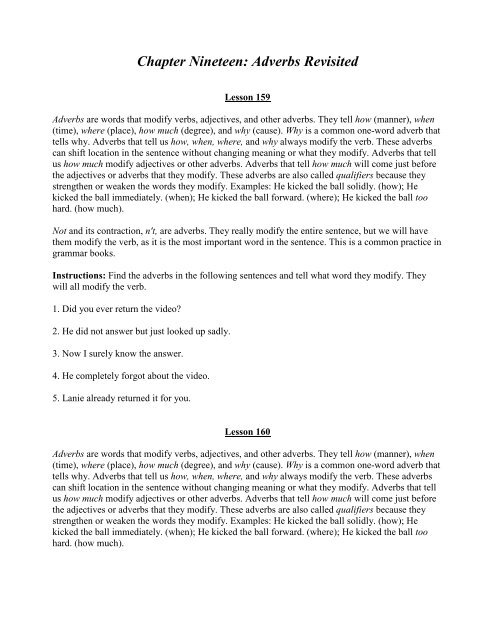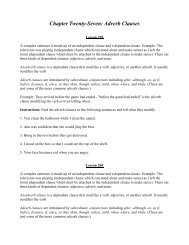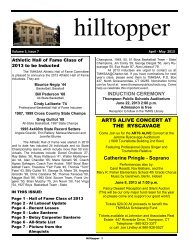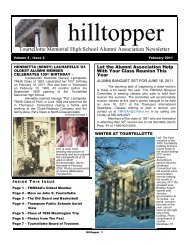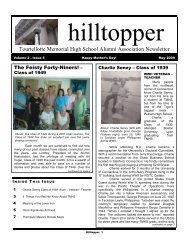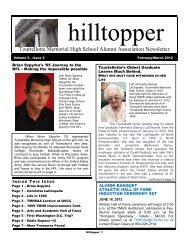Chapter Nineteen: Adverbs Revisited - thompson public schools
Chapter Nineteen: Adverbs Revisited - thompson public schools
Chapter Nineteen: Adverbs Revisited - thompson public schools
Create successful ePaper yourself
Turn your PDF publications into a flip-book with our unique Google optimized e-Paper software.
<strong>Chapter</strong> <strong>Nineteen</strong>: <strong>Adverbs</strong> <strong>Revisited</strong>Lesson 159<strong>Adverbs</strong> are words that modify verbs, adjectives, and other adverbs. They tell how (manner), when(time), where (place), how much (degree), and why (cause). Why is a common one-word adverb thattells why. <strong>Adverbs</strong> that tell us how, when, where, and why always modify the verb. These adverbscan shift location in the sentence without changing meaning or what they modify. <strong>Adverbs</strong> that tellus how much modify adjectives or other adverbs. <strong>Adverbs</strong> that tell how much will come just beforethe adjectives or adverbs that they modify. These adverbs are also called qualifiers because theystrengthen or weaken the words they modify. Examples: He kicked the ball solidly. (how); Hekicked the ball immediately. (when); He kicked the ball forward. (where); He kicked the ball toohard. (how much).Not and its contraction, n't, are adverbs. They really modify the entire sentence, but we will havethem modify the verb, as it is the most important word in the sentence. This is a common practice ingrammar books.Instructions: Find the adverbs in the following sentences and tell what word they modify. Theywill all modify the verb.1. Did you ever return the video?2. He did not answer but just looked up sadly.3. Now I surely know the answer.4. He completely forgot about the video.5. Lanie already returned it for you.Lesson 160<strong>Adverbs</strong> are words that modify verbs, adjectives, and other adverbs. They tell how (manner), when(time), where (place), how much (degree), and why (cause). Why is a common one-word adverb thattells why. <strong>Adverbs</strong> that tell us how, when, where, and why always modify the verb. These adverbscan shift location in the sentence without changing meaning or what they modify. <strong>Adverbs</strong> that tellus how much modify adjectives or other adverbs. <strong>Adverbs</strong> that tell how much will come just beforethe adjectives or adverbs that they modify. These adverbs are also called qualifiers because theystrengthen or weaken the words they modify. Examples: He kicked the ball solidly. (how); Hekicked the ball immediately. (when); He kicked the ball forward. (where); He kicked the ball toohard. (how much).
Not and its contraction, n't, are adverbs. They really modify the entire sentence, but we will havethem modify the verb, as it is the most important word in the sentence. This is a common practice ingrammar books.Instructions: Find the adverbs in the following sentences and tell what word they modify. Theywill all modify an adjective.1. An unusually intelligent group attended the lecture.2. My wife has an exceptionally keen mind.3. We have had a surprisingly small amount of snow.4. The bus to Trax was very late.5. The train car was completely full.Lesson 161<strong>Adverbs</strong> are words that modify verbs, adjectives, and other adverbs. They tell how (manner), when(time), where (place), how much (degree), and why (cause). Why is a common one-word adverb thattells why. <strong>Adverbs</strong> that tell us how, when, where, and why always modify the verb. These adverbscan shift location in the sentence without changing meaning or what they modify. <strong>Adverbs</strong> that tellus how much modify adjectives or other adverbs. <strong>Adverbs</strong> that tell how much will come just beforethe adjectives or adverbs that they modify. These adverbs are also called qualifiers because theystrengthen or weaken the words they modify. Examples: He kicked the ball solidly. (how); Hekicked the ball immediately. (when); He kicked the ball forward. (where); He kicked the ball toohard. (how much).Not and its contraction, n't, are adverbs. They really modify the entire sentence, but we will havethem modify the verb, as it is the most important word in the sentence. This is a common practice ingrammar books.Instructions: Find the adverbs modifying other adverbs in the following sentences and tell whatword they modify.1. The announcer should speak less loudly.2. You should do much better.3. People shouldn't change their jobs too often.4. Very slowly the car started down the hill.5. The contestant answered the question rather uncertainly.
Lesson 162Adverbial objectives, or adverbial nouns, are nouns used as adverbs. They usually tell amount,weight, time, distance, direction or value. They can have adjectives modifying them. Example: Hewaited two days.Instructions: Find the adverbial nouns in the following sentences and tell what word they modify.1. Yesterday Jim came home.2. Tomorrow I will walk a mile.3. The boulder landed three feet from me.4. Will works mornings and nights.5. This package cost five dollars.Lesson 163<strong>Adverbs</strong> are words that modify verbs, adjectives, and other adverbs. They tell how (manner), when(time), where (place), how much (degree), and why (cause). Why is a common one-word adverb thattells why. <strong>Adverbs</strong> that tell us how, when, where, and why always modify the verb. These adverbscan shift location in the sentence without changing meaning or what they modify. <strong>Adverbs</strong> that tellus how much modify adjectives or other adverbs. <strong>Adverbs</strong> that tell how much will come just beforethe adjectives or adverbs that they modify. These adverbs are also called qualifiers because theystrengthen or weaken the words they modify. Examples: He kicked the ball solidly. (how); Hekicked the ball immediately. (when); He kicked the ball forward. (where); He kicked the ball toohard. (how much).Not and its contraction, n't, are adverbs. They really modify the entire sentence, but we will havethem modify the verb, as it is the most important word in the sentence. This is a common practice ingrammar books.Instructions: Find the adverbs in the following sentences and tell what word they modify.1. This suitcase weighs a ton.2. The grandchildren happily swung back and forth in the swing.3. The climber edged slowly and carefully along the ledge.4. He is a rather bashful person.5. Every afternoon the baby cries very forcefully for food.
Quiz for Lessons 159-163Instructions: Find the adverbs in the following sentences and tell what word they modify.1. The pancakes are almost ready.2. The student answered the teacher nervously but clearly.3. The tour will leave early today.4. I am still unusually tired by afternoon.5. The stranded hiker quietly gave up the chance of rescue.6. Yesterday our fullback fumbled twice in the game.7. Why couldn't you blow out your candles?8. My little brother almost always eats the most at dinner.9. Haven't you ridden your new motor bike yet?10. Your essay was written very neatly and legibly.---------------- The answers can be found at the end of the chapter. ----------------Lesson 164<strong>Adverbs</strong> are words that modify verbs, adjectives, and other adverbs. They tell how (manner), when(time), where (place), how much (degree), and why (cause). Why is a common one-word adverb thattells why. <strong>Adverbs</strong> that tell us how, when, where, and why always modify the verb. These adverbscan shift location in the sentence without changing meaning or what they modify. <strong>Adverbs</strong> that tellus how much modify adjectives or other adverbs. <strong>Adverbs</strong> that tell how much will come just beforethe adjectives or adverbs that they modify. These adverbs are also called qualifiers because theystrengthen or weaken the words they modify. Examples: He kicked the ball solidly. (how); Hekicked the ball immediately. (when); He kicked the ball forward. (where); He kicked the ball toohard. (how much).Not and its contraction, n't, are adverbs. They really modify the entire sentence, but we will havethem modify the verb, as it is the most important word in the sentence. This is a common practice ingrammar books.Instructions: Find the adverbs in the following sentences and tell what word they modify.1. The student angrily left the room.2. Carefully Barbara backed the car from the driveway.
3. That family works well together.4. Slowly but boldly the soldiers approached the fortress.5. The organization unanimously voted to assist in the effort.Lesson 165<strong>Adverbs</strong> are words that modify verbs, adjectives, and other adverbs. They tell how (manner), when(time), where (place), how much (degree), and why (cause). Why is a common one-word adverb thattells why. <strong>Adverbs</strong> that tell us how, when, where, and why always modify the verb. These adverbscan shift location in the sentence without changing meaning or what they modify. <strong>Adverbs</strong> that tellus how much modify adjectives or other adverbs. <strong>Adverbs</strong> that tell how much will come just beforethe adjectives or adverbs that they modify. These adverbs are also called qualifiers because theystrengthen or weaken the words they modify. Examples: He kicked the ball solidly. (how); Hekicked the ball immediately. (when); He kicked the ball forward. (where); He kicked the ball toohard. (how much).Not and its contraction, n't, are adverbs. They really modify the entire sentence, but we will havethem modify the verb, as it is the most important word in the sentence. This is a common practice ingrammar books.Instructions: Find the adverbs in the following sentences and tell what word they modify.1. Now and then I become creative.2. Soon you will see that sight again.3. He made the corrections on the computer immediately.4. Sometimes you make unnecessary statements.5. Lately I take walks often.Lesson 166<strong>Adverbs</strong> are words that modify verbs, adjectives, and other adverbs. They tell how (manner), when(time), where (place), how much (degree), and why (cause). Why is a common one-word adverb thattells why. <strong>Adverbs</strong> that tell us how, when, where, and why always modify the verb. These adverbscan shift location in the sentence without changing meaning or what they modify. <strong>Adverbs</strong> that tellus how much modify adjectives or other adverbs. <strong>Adverbs</strong> that tell how much will come just beforethe adjectives or adverbs that they modify. These adverbs are also called qualifiers because theystrengthen or weaken the words they modify. Examples: He kicked the ball solidly. (how); Hekicked the ball immediately. (when); He kicked the ball forward. (where); He kicked the ball toohard. (how much).
Not and its contraction, n't, are adverbs. They really modify the entire sentence, but we will havethem modify the verb, as it is the most important word in the sentence. This is a common practice ingrammar books.Instructions: Find the adverbs in the following sentences and tell what word they modify.1. Do you live here?2. Should we play inside or outside?3. Where is your coat, young man?4. From the sound the bears must be nearby.5. There he goes.Lesson 167<strong>Adverbs</strong> are words that modify verbs, adjectives, and other adverbs. They tell how (manner), when(time), where (place), how much (degree), and why (cause). Why is a common one-word adverb thattells why. <strong>Adverbs</strong> that tell us how, when, where, and why always modify the verb. These adverbscan shift location in the sentence without changing meaning or what they modify. <strong>Adverbs</strong> that tellus how much modify adjectives or other adverbs. <strong>Adverbs</strong> that tell how much will come just beforethe adjectives or adverbs that they modify. These adverbs are also called qualifiers because theystrengthen or weaken the words they modify. Examples: He kicked the ball solidly. (how); Hekicked the ball immediately. (when); He kicked the ball forward. (where); He kicked the ball toohard. (how much).Not and its contraction, n't, are adverbs. They really modify the entire sentence, but we will havethem modify the verb, as it is the most important word in the sentence. This is a common practice ingrammar books.Instructions: Find the adverbs in the following sentences and tell what word they modify.1. I am too tired to play.2. I am very sorry about your extremely sore leg.3. The storm was almost completely over at noon.4. You look so much better.5. Your father looks rather feeble.
Lesson 168<strong>Adverbs</strong> are words that modify verbs, adjectives, and other adverbs. They tell how (manner), when(time), where (place), how much (degree), and why (cause). Why is a common one-word adverb thattells why. <strong>Adverbs</strong> that tell us how, when, where, and why always modify the verb. These adverbscan shift location in the sentence without changing meaning or what they modify. <strong>Adverbs</strong> that tellus how much modify adjectives or other adverbs. <strong>Adverbs</strong> that tell how much will come just beforethe adjectives or adverbs that they modify. These adverbs are also called qualifiers because theystrengthen or weaken the words they modify. Examples: He kicked the ball solidly. (how); Hekicked the ball immediately. (when); He kicked the ball forward. (where); He kicked the ball toohard. (how much).Not and its contraction, n't, are adverbs. They really modify the entire sentence, but we will havethem modify the verb, as it is the most important word in the sentence. This is a common practice ingrammar books.Instructions: Find the adverbs in the following sentences and tell what word they modify.1. The completely exhausted boater was quickly pulled aboard.2. The manager has called me once or twice about policy.3. Usually these antibiotics work rather slowly.4. The Christmas decorations surely weren't very expensive.5. Harry greedily had too much candy.Quiz for Lessons 164-168Instructions: Find the adverbs in the following sentences and tell what word they modify.1. You are almost always the leader.2. Please turn around slowly, Ted.3. Now we will try this totally complicated case.4. Again and again he had been warned about the very extreme weather.5. Certainly he looks decidedly older in that somewhat dim light.6. The missing document reappeared suddenly and rather mysteriously.7. I will never come here again.8. Pavarotti sings very well.
9. Today you surely will tell a totally truthful story.10. Almost every answer has been quickly and assuredly given.---------------- The answers can be found at the end of the chapter. ----------------Lesson 169Instructions: Using all the knowledge learned in the previous lessons, identify the words in bold asa verb, noun, pronoun, adjective, or adverb in the following sentences.1. Did you see the oil well in Canada? Most of us have not been there.2. I do my assignments well. Jeff is also fast and efficient.3. Mother drives too fast. Surely she should drive better.4. This isn't a long diet. Maybe you should fast more often.5. Have you been here long? Did you come by the back way?6. I often long for the good old days of the '50's.7. State Street heads south, the most direct route.8. Citizens, on most summer days we have a south wind each evening.9. I once lived in the South. Our family still goes back for visits.10. This highway is a better road than the dirt one.Lesson 170Instructions: Using all the knowledge learned in the previous lessons, find the verb, subjects,predicate nominatives, direct objects, appositives, nouns of address, adjectives and adverbs inthe following sentences.1. Jerry, I arrived back just now.2. This building has never seemed especially high before.3. Today we ate an extremely good grapefruit, our breakfast.4. A raccoon was busily washing its food.5. The winding path had become somewhat steep and slightly uneven.
Lesson 171Instructions: Using all the knowledge learned in the previous lessons, find the verb, subjects,predicate nominatives, direct objects, appositives, nouns of address, adjectives and adverbs inthe following sentences.1. Ila and I diligently prepared the garden and planted carefully the corn seeds.2. The legislators are heatedly debating the gun issue.3. Have you ever seen that beautiful butterfly bush?4. Eric looked around rather hastily and ran away quickly.5. Suddenly the siren sounded loudly and sharply.Lesson 172Instructions: Using all the knowledge learned in the previous lessons, find the verb, subjects,predicate nominatives, direct objects, appositives, nouns of address, adjectives and adverbs inthe following sentences.1. The small children stumbled clumsily and tumbled down.2. Shortly the weather could be bitterly cold again.3. Wait here patiently and remain perfectly silent.4. The chipmunk darted in quickly and instantly grabbed the fallen acorn.5. The new friend was the tall, handsome boy.Lesson 173Instructions: Using all the knowledge learned in the previous lessons, find the verb, subjects,predicate nominatives, direct objects, appositives, nouns of address, adjectives and adverbs inthe following sentences.1. My friend called me once or twice yesterday.2. Pam left the market slowly and very unhappily.3. Collette, did you just have your sixth birthday?
4. Happy children never become really unhappy grownups.5. Have you taken often that trip, an Alaskan cruise?Quiz for Lessons 169 - 173Instructions: Using all the knowledge learned in the previous lessons, find the verb, subjects,predicate nominatives, direct objects, appositives, nouns of address, adjectives and adverbs inthe following sentences.1. Soon John will be too big and will need far more time.2. The city council usually runs this city fairly efficiently.3. Unfortunately all people are not free.4. The boat owner started the engine up and cast off the lines.5. Mom, can I go and watch the game?6. How can you be so slovenly?7. Yogurt is almost completely nonfattening.8. Mrs. Carter, that is my cousin David.9. Art Buchwald, a humorous writer, has a really good column.10. Did anyone call, Ann?---------------- The answers can be found at the end of the chapter. ----------------
<strong>Chapter</strong> 19 Answer KeyLesson 159 Answers:1. ever modifies did return2. not modifies did answer, just/up/sadly modify looked3. now/surely modify know4. completely modifies forgot5. already modifies returnedLesson 160 Answers:1. unusually modifies intelligent2. exceptionally modifies keen3. surprisingly modifies small4. very modifies late5. completely modifies fullLesson 161 Answers:1. less modifies loudly2. much modifies better3. too modifies often4. very modifies slowly5. rather modifies uncertainlyLesson 162 Answers:1. yesterday/home modify the verb came2. tomorrow/mile modify the verb will walk3. feet modifies the verb landed4. mornings/nights modify the verb works5. dollars modifies the verb costLesson 163 Answers:1. ton modifies the verb weighs2. happily/back/forth modify the verb swung3. slowly/carefully modify the verb edged4. rather modifies the adjective bashful5. afternoon/forcefully modify the verb cries, very modifies the adverb forcefullyAnswers for Quiz (Lessons 159-163):1. almost modifies the adjective ready2. nervously/clearly modify the verb answered3. early/today modify the verb will leave4. still modifies the verb am, unusually modifies the adjective tired5. quietly/up modify the verb gave6. yesterday/twice modify the verb fumbled7. why/n't/out modify the verb could blow8. always modifies the verb eats, almost modifies the adverb always9. n't/yet modify the verb have ridden
10. neatly/legibly modify the verb was written, very modifies the adverb neatly (possibly legiblyalso)Lesson 164 Answers:1. angrily modifies the verb left telling how2. carefully modifies the verb backed telling how3. well/together modify the verb works both telling how4. slowly/boldly modify the verb approached telling how5. unanimously modifies the verb voted telling howLesson 165 Answers:1. now/then modify the verb become telling when2. soon/again modify the verb will see telling when3. immediately modifies the verb made telling when4. sometimes modifies the verb make telling when5. lately/often modify the verb take telling whenLesson 166 Answers:1. here modifies the verb do live telling where2. inside/outside modify the verb should play telling where3. where modifies the verb is telling where4. nearby modifies the verb must be telling where5. there modifies the verb goes telling whereLesson 167 Answers:1. too modifies the predicate adjective tired telling how much2. very modifies the predicate adjective sorry telling how much, extremely modifies the adjectivesore telling how much3. almost modifies the adverb completely telling how much, completely modifies the predicateadjective over telling how much4. so modifies the adverb much telling how much, much modifies the predicate adjective bettertelling how much5. rather modifies the predicate adjective feeble telling how muchLesson 168 Answers:1. completely modifies the adjective exhausted telling how much, quickly modifies the verb waspulled telling how, aboard modifies the verb was pulled telling where2. once/twice modify the verb has called telling when3. usually/slowly modify the verb work telling how, rather modifies the adverb slowly telling howmuch4. surely/n't modify the verb were telling how, very modifies the predicate adjective expensivetelling how much5. greedily modifies the verb had telling how, too modifies the adjective much telling how muchAnswers for Quiz (Lessons 164-168):1. almost modifies the adverb always telling how much, always modifies the verb are telling when2. please/around/slowly modify the verb turn telling how3. now modifies the verb will try telling when, totally modifies the adjective complicated tellinghow much
4. again/again modify the verb had been warned telling when, very modifies the adjective extremetelling how much5. certainly modifies the verb looks telling how, decidedly modifies the adjective older telling howmuch, somewhat modifies the adjective dim telling how much6. suddenly/mysteriously modify the verb reappeared telling how, rather modifies the adverbmysteriously telling how much7. never/again modify the verb will come telling when, here modifies the verb will come tellingwhere8, well modifies the verb sings telling how, very modifies the adverb well telling how much9. today modifies the verb will tell telling when, surely modifies the verb will tell telling how,totally modifies the adjective truthful telling how much10. quickly/assuredly modify the verb has been given telling how, almost modifies the adjectiveevery telling how muchLesson 169 Answers:1. well = noun, most = pronoun2. well = adverb. fast = adjective3. fast = adverb, better = adverb4. this = pronoun, long = adjective, fast = verb5. long = adverb, back = adjective6. long = verb7. south = adverb, most = adverb8. most = adjective, south = adjective9. South = noun, back = adverb10. this = adjective, better = adjectiveLesson 170 Answers:1. arrived = verb; I = subject; Jerry = noun of address; back/now = adverbs modifying the verb; just= adverb modifying adverb now2. has seemed = verb; building = subject; high = predicate adjective modifying subject; this =adjective modifying subject, never/before = adverb modifying verb; especially = adverbmodifying adjective high3. ate = verb; we = subject; grapefruit = direct object; breakfast = appositive; an/good = adjectivesmodifying grapefruit; our = adjective modifying breakfast; today = adverb modifying verb;extremely = adverb modifying adjective good4. was washing = verb; raccoon = subject; food = direct object; a = adjective modifying raccoon; its= adjective modifying food; busily = adverb modifying verb5. had become = verb; path = subject; steep/uneven = predicate adjectives modifying subject;the/winding = adjectives modifying path; somewhat = adverb modifying predicate adjectivesteep; slightly = adverb modifying predicate adjective unevenLesson 171 Answers:1. prepared/planted = verbs; Ila/I = subjects; garden = direct object to verb prepared; seeds = directobject to verb planted; the = adjective modifying garden; the/corn = adjectives modifying seeds;diligently = adverb modifying prepared; carefully = adverb modifying planted2. are debating = verb; legislators = subject; issue = direct object; the = adjective modifyinglegislators; the/gun = adjectives modifying issue; heatedly = adverb modifying verb
3. have seen = verb; you = subject; bush = direct object; that/beautiful/butterfly = adjectivesmodifying bush; ever = adverb modifying verb4. looked/ran = verbs; Eric = subject; around/hastily = adverbs modifying looked; rather = adverbmodifying hastily; away/quickly = adverbs modifying ran5. sounded = verb; siren = subject; the = adjective modifying siren; suddenly/loudly/sharply =adverbs modifying soundedLesson 172 Answers:1. stumbled/tumbled = verbs; children = subject; the/small = adjectives modifying children;clumsily = adverb modifying stumbled; down = adverb modifying tumbled2. could be = verb; weather = subject; cold = predicate adjective; shortly/again = adverbs modifyingverb; bitterly = adverb modifying cold; the = adjective modifying subject3. wait/remain = verbs; you (understood) = subject; silent = predicate adjective to verb remain;here/patiently = adverbs modifying wait; perfectly = adverb modifying silent4. darted/grabbed = verbs; chipmunk = subject; acorn = direct object to verb grabbed; the =adjective modifying chipmunk; the/fallen = adjectives modifying acorn; in/quickly = adverbsmodifying darted; instantly = adverb modifying grabbed5. was = verb; friend = subject; boy = predicate nominative; the/new = adjective modifying friend;the/tall/handsome = adjectives modifying boyLesson 173 Answers:1. called = verb; friend = subject; me = direct object; my = adjective modifying friend;once/twice/yesterday = adverbs modifying verb2. left = verb; Pam = subject; market = direct object; the = adjective modifying market;slowly/unhappily = adverbs modifying verb; very = adverb modifying unhappily3. did have = verb; you = subject; Collette = noun of address; birthday = direct object; your/sixth =adjectives modifying birthday; just = adverb modifying verb4. become = verb; children = subject; grownups = predicate nominative; happy = adjectivemodifying subject; unhappy = adjective modifying grownups; never = adverb modifying verb;really = adverb modifying unhappy5. have taken = verb; you = subject; trip = direct object; cruise = appositive; that = adjectivemodifying trip; an/Alaskan = adjectives modifying cruise; often = adverb modifying verbAnswers for Quiz (Lessons 169-173):1. will be/will need = verbs; John = subject; big = predicate adjective; time = direct object; more =adjective modifying time; far = adverb modifying more; too = adverb modifying big; soon =adverb modifying both verbs2. runs = verbs; city council = subject; city = direct object; the = adjective modifying subject; this =adjective modifying city; usually/ efficiently = adverbs modifying verb; fairly = adverbmodifying efficiently3. are = verb; people = subject; free = predicate adjective; all = adjective modifying subject;unfortunately/not = adverbs modifying verb4. started/cast = verbs; owner = subject; engine = direct object to verb started; lines = direct objectto verb cast; the/boat = adjectives modifying owner; the = adjective modifying engine; the =adjective modifying lines; up = adverb modifying started; off = adverb modifying cast5. can go/(can) watch = verbs; I = subject; game = direct object to verb (can) watch; Mom = nounof address; the = adjective modifying game
6. can be = verb; you = subject; slovenly = predicate adjective modifying verb; how = adverbmodifying verb; so = adverb modifying slovenly7. is = verb; yogurt = subject; nonfattening = predicate adjective modifying subject; completely =adverb modifying nonfattening; almost = adverb modifying completely8. is = verb; that = subject; cousin = predicate nominative; David = appositive; Mrs. Carter = nounof address; my = adjective modifying cousin9. has = verb; Art Buchwald = subject; column = direct object; writer = appositive; a/humorous =adjectives modifying writer; a/good = adjectives modifying column; really = adverb modifyinggood10. did call = verb; anyone = subject; Ann = noun of address


